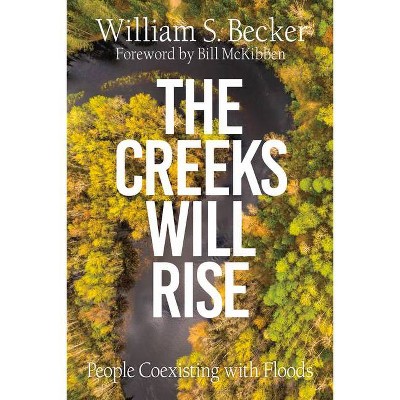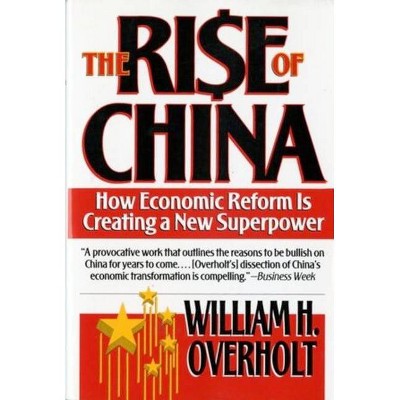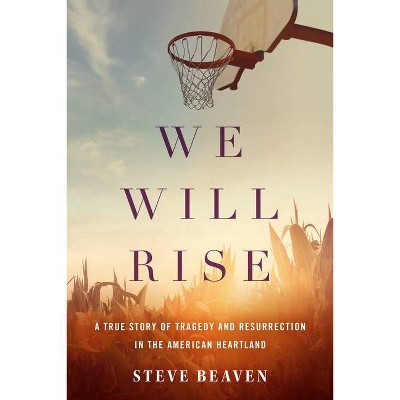The Creeks Will Rise - by William S Becker (Paperback)

Similar Products
Products of same category from the store
AllProduct info
<p/><br></br><p><b> About the Book </b></p></br></br>"In pursuit of economic growth, the United States and other developed countries are testing the tolerance of the natural world. The results include the loss of valuable ecosystems, global climate change, and the degradation of the planet's ability to support life. Journalist William Becker argues that our mission in the 21st century should be to fix what we have broken in the natural world and to enlist healthy ecosystems in our pursuit of economic and physical security. Becker begins by sounding an alarm about the inability of the dams and levees we built over the last century to handle the severity of sea-level rise and record floods we see today. The Creeks Will Rise delves into some of the historical and philosophical underpinnings that have led to the climate change situation we now find ourselves in. Becker fearlessly takes on the fossil fuel industry, holding it accountable for the enormous contribution it has made to climate change. He also includes recommendations for solutions as well as specific advice and resources for anyone working toward resolving the climate crisis"--Publisher's website.<p/><br></br><p><b> Book Synopsis </b></p></br></br><b>Climate change is causing larger and more frequent weather disasters. </b> <br> Floods are the most frequent and costly in the United States, causing $17 billion annually in damages between 2010 and 2018--and experts predict damages will double by 2051. How should we respond? <br> Climate change expert Bill Becker argues we should not respond by building more flood-control structures like dams, levees, and seawalls. That was the policy of the last century. The nation's 92,000 dams and 30,000 miles of levees are aging and insufficient to stop the floods we see today. More than 100 million Americans are now at risk. <br><i>The Creeks Will Rise: People Coexisting with Floods</i> makes a compelling case that we must begin collaborating with nature. Wherever possible, communities should help flood-prone families move to safer places. We should return the land to rivers and oceans and restore the wetlands, coastal marshes, and other ecosystems that provide natural flood protection. <br> Becker writes from experience. He helped move a flood-prone community to higher ground forty years ago. He has since worked with scores of flooded communities to help them plan their recoveries. <br><b>We must collaborate with nature rather than trying to control it.</b><p/><br></br><p><b> Review Quotes </b></p></br></br><br><b><i>"The</i><i>Creeks Will Rise</i> is the provocative story of how our strategy for dealing with our most destructive type of weather disaster--floods--is dangerously outdated. Bill Becker argues our entire approach to dealing with nature is outdated, too, and we are paying for it with lives and treasure. Climate change is one of many consequences. Congress should take note of this book. So should we all."</b> --Timothy E. Wirth, US Senate (ret), Vice Chairman, United Nations Foundation and Better World Fund<br><br><b>"After describing one of the most severe consequences of climate change, Bill Becker digs down to the root of this existential threat. It goes much deeper than pollution from fossil fuels. Climate change proves how far our species has pushed Earth's life-support systems out of balance. Becker calls for dedicating the rest of this century to fixing what we've broken, insofar as it can be fixed, including our fundamental relationship with the rest of life in the biosphere. No mission is more important."</b> --Hunter Lovins, cofounder of the Rocky Mountain Institute and president of Natural Capitalism Solutions <br><br><br><b>"Bill Becker has pulled off the nearly impossible: a gripping personal story neatly integrated into a comprehensive analysis of the dangers we face with climate change</b>-<b>driven flooding. He caps this off with a concise handbook for communities ready to be proactive. Altogether a well-documented and clear explanation of why what we do in the future must be different from what we did in the past. Of the many climate change books now appearing, this is one to read."</b> --D. James Baker, Undersecretary of Commerce and Administrator of the National Oceanic and Atmospheric Administration, 1993-2001 <br><br><br><b>"Bill Becker is among the most reliable, practical, and farsighted commentators on energy and environmental policies. In<i> The Creeks Will Rise</i> he describes the imperative of designing infrastructure with, not against, the forces of nature. The point is to save lives, property, and billions of dollars. To do so we will have to outgrow the errant myths that the continent was inexhaustible and endless growth possible or even desirable. Essential reading as a cogent and thoughtful roadmap to a more sane and prosperous future."</b> --David Orr, author of <i>Earth in Mind</i>, <i>Dangerous Years</i>, and <i>Down to the Wire</i><br><br><b>"Bravo! A compelling piece of work that flows like a powerful river. It tells us why we must work with Nature, not against it--an important message not only for the US public but for all the citizens of the world."</b> --Grazia Francescato, past president of Italian Greens and former Green member of the Italian Parliament <br><br><br><b>"For more than a century, global warming has been leading to rising sea levels and increasing downpours. In <i>The Creeks Will Rise</i>, Bill Becker focuses on an emerging solution to flood disasters along rivers and coasts. A clear lesson is that it costs much less in lives and property to listen to science and take action now instead of responding time after time to the deadly and destructive consequences of climate change."</b> --Michael C. MacCracken, Chief Scientist for Climate Change Programs, Climate Institute<br><br><b>"Living near water, as half of us do, has become a dangerous proposition. Rising waters and big rains, driven by climate change, together with fragile dams and ancient infrastructure, have made it so. Something new is in order, and Becker's affecting, informed account deals compellingly with the course we must now take. His vision provides the inspiration and direction we urgently need, especially in light of our national focus on infrastructure. Strongly recommended."</b> --Gus Speth, former dean, Yale School of the Environment and author of <i>America the Possible</i> <br><br><br><b>"The climate crisis continues to accelerate, even as thousands of America's dams, levees, and sea walls pass their expiration dates. It is hubris to think we humans will contain hurricanes, 1,000-year floods, and rising seas with concrete and rebar. Any smart general, facing a more powerful force, will pull her troops back to a defensible position. Bill Becker argues persuasively that we must move our homes and businesses away from floodplains and beachfronts. We must learn to live in harmony with forces beyond our control."</b> --Denis Hayes, founding chair of EarthDay.org <br><br><br><b>"We all know how 'complicated' addressing today's climate emergency has become. It's so revealing to see that done through the lens of the relationship between the American people and their rivers and coastlines, as Bill Becker weaves together historical and contemporary records to shed light on what needs to happen in the future. <i>The Creeks Will Rise</i> provides an extraordinary snapshot of a nation and its people having to rethink what progress means, as accelerating climate change undoes past certainties and present fantasies."</b> --Jonathon Porritt, author, campaigner, and founder of Forum for the Future <br><br><p/><br></br><p><b> About the Author </b></p></br></br><b>William Becker </b>is a writer, journalist, and policy expert on energy, climate change, and disaster prevention and recovery. His eclectic career includes roles as the Executive Assistant to the Attorney General of Wisconsin, Counselor to the Administrator of the U.S. Small Business Administration, and Special Assistant to the Assistant Secretary for Energy Efficiency and Renewable Energy at the U.S. Department of Energy. He earned a Bronze Medal as a U.S. Army combat correspondent during the Vietnam War and served as a writer/photographer for the Associated Press, editorial writer for the <i>Wisconsin State Journal</i>, and publisher of his own weekly newspaper in Wisconsin. <b>Bill McKibben </b>is an environmentalist, educator, climate activist, and the author of <i>The End of Nature</i>, widely regarded as the first book on climate change for a general audience.
Price History
Cheapest price in the interval: 18.89 on November 8, 2021
Most expensive price in the interval: 18.89 on December 20, 2021
Price Archive shows prices from various stores, lets you see history and find the cheapest. There is no actual sale on the website. For all support, inquiry and suggestion messages communication@pricearchive.us




















